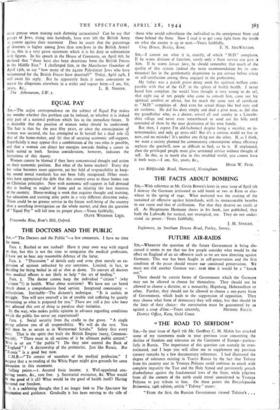THE DOCTORS AND THE PUBLIC
siit,—" The Doctors and the Public "—a few comments. I have no time for more.
Para. r. Rushed or not rushed? Have it your own way with regard to that, but this is not the time to reorganise the medical profession. I have yet to hear any reasonable defence of the latter.
Para. 2. "Discussion" of details only and even then merely an ex- pression of opinion unbacked by any sanctions. Limited, in fact, to deciding for being boiled in oil or shot at dawn. To convert all doctors into medical officers is not likely to help " the art of hearing."
Para. 3. The doctor cannot keep the individual "citizen" (why " citizen "?) in health. What about nutrition? We have not yet heard much about a comprehensive food service. Integrated community = collectivisut. Inevitable—The dictator's technique. " It is useless to struggle. You will save yourself a lot of trouble and suffering by quietly submitting to what is prepared for you." There are still a few who have not allowed thiS sort of thing to paralyse their initiative.
By the way, who makes public opinion in advance regarding conditions which the public has never yet experienced? Para. 5. Social security from the cradle to the grave. " A single 'tamp relieves you of all responsibility. We will do the rest. You will then be as secure as in Wormwood Scrubs." Safety first every time. That is the spirit that built the British Empire (sorry, Common- ealth). " There must in all sections of it be ultimate public control." Who is or are the public"? Do they now control the Bank of "England" 1 A dictatorship pf the proletariat. Just like Russia. But "Russia " is a:good boy now.
C.M.B.—" To consist of members of the medical profession." I suggest that a re-reading of the White Paper might give grounds for some alteration in this statement.
Selling points.—T. Assured basic income. 2. Well-appointed con- tilting rooms, &c., rent free. 3. Secretarial assistance, &c. What would the good of it all? What would be the good of health itself? Having rtered our freedom.
It is a carleirellfng thought that I no longer look to The Spectator for .1:lization-and guidance. Gradually it has been moving to the side of
• those who would subordinate the individual to the omnipotent State and those behind the State. Now I read it to get some light from the inside on what the enemy is up to next.—Yeurs faithfully,


























 Previous page
Previous page